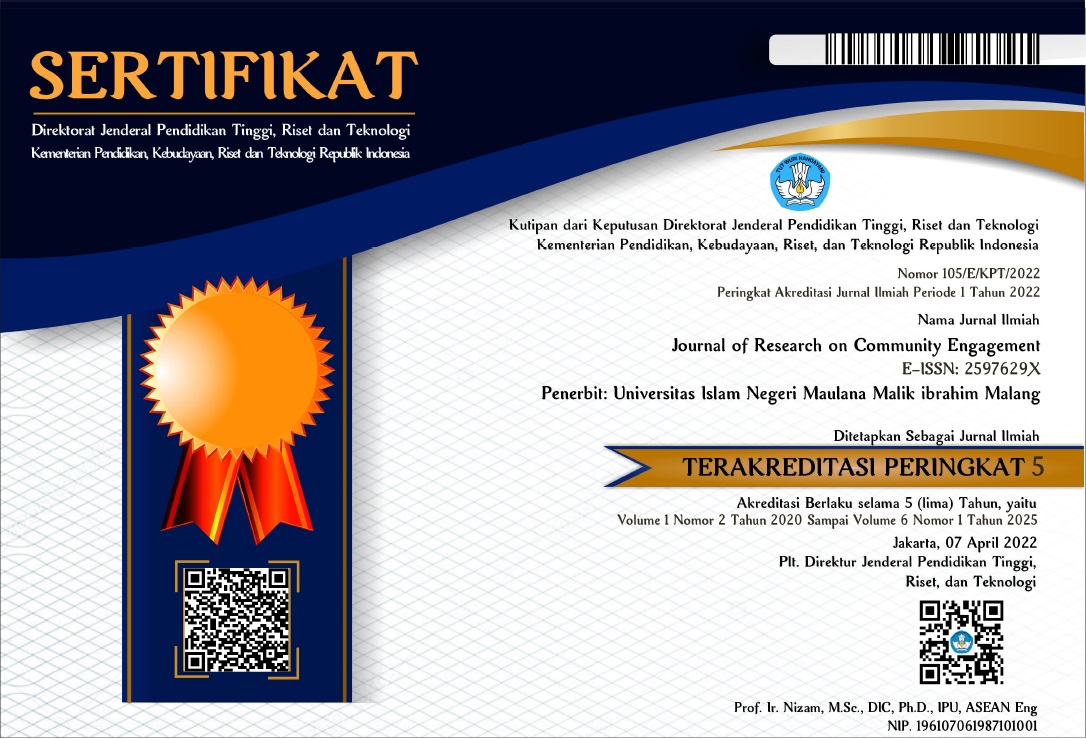The Stakeholders Engagement Study in Rural Development Program
Abstract
Full Text:
PDFReferences
[1] S. Sjaf, N. K. Hidayat, Z. A. KaswantiBarlan, L. Elson, Sampean, and H. F. Gunadi, “Measuring Achievement of Sustainable Development Goals in Rural Area : A Case Study of Sukamantri Village in Bogor District , West Java , Indonesia Mengukur Pencapaian Tujuan Pembangunan Berkelanjutan di Pedesaan : Studi Kasus,” Sodality J. Sosiol. Pedesaan, vol. 09, no. 02, 2021.
[2] European Network for Rural Development, “Increasing Stakeholder Involvement in Rural Development Implementation ENRD Thematic Group Report Final Draft,” 2015. [Online]. Available: https://enrd.ec.europa.eu/sites/enrd/files/tg_stakeholder-involvement_final-report.pdf
[3] E. Suryanti, S. Sumartono, and H. Hermawan, “Culture Development Planning in the Special Region of Yogyakarta (Management Planning of Cultural Heritage in Kotagede District based on Community Empowerment Conservation Model),” J. Indones. Tour. Dev. Stud., vol. 2, no. 3, pp. 120–128, 2014, doi: 10.21776/ub.jitode.2014.002.03.05.
[4] F. J. Santosa, R. Setyowati, and A. Wibowo, “The Social Capital Ability to Communal Cattle Survive in Rural of Special Region of Yogyakarta, Indonesia,” Indones. J. Soc. Res., vol. 5, no. 2, pp. 168–180, 2023, doi: 10.30997/ijsr.v5i2.271.
[5] F. J. Santosa, R. Setyowati, and A. Wibowo, “Bisakah Pembangunan Pedesaan Berhasil? Studi Kasus Kandang Komunal di Desa Kulwaru, Yogyakarta,” in Prosiding Seminar Nasional Perbatasan dan Desa, 2021, pp. 109–117.
[6] R. K. Yin, Case Study Research : Design and Methods, Sebelas. Jakarta: PT Grafindo Persada, 2012.
[7] J. . Cresswell, Research Design: Pendekatan Metode Kualitatif, Kuantitatif, dan Campuran, Third. Yogyakarta: Pustaka Pelajar, 2018.
[8] Sugiyono, Metode Penelitian Kuantitatif, Kualitatif, dan R&D, Pertama. Bandung: Alfabeta, 2019.
[9] I. N. Rachmawati, “Pengumpulan Data Dalam Penelitian Kualitatif: Wawancara,” J. Keperawatan Indones., vol. 11, no. 1, pp. 35–40, 2007, doi: 10.7454/jki.v11i1.184.
[10] B. Supriyanto, I. Juniar Puspita, I. Nuryanto, and Hasnawir, “Integrated Area Development: A New Social Forestry Landscape Approach in Indonesia,” IOP Conf. Ser. Earth Environ. Sci., vol. 1299, no. 1, p. 012006, 2024, doi: 10.1088/1755-1315/1299/1/012006.
DOI: https://doi.org/10.18860/jrce.v6i1.27375
Refbacks
- There are currently no refbacks.
Copyright (c) 2024 Fajar Julian Santosa, Retno Setyowati, Agung Wibowo

This work is licensed under a Creative Commons Attribution-ShareAlike 4.0 International License.
Editorial Office:
Lembaga Penelitian dan Pengabdian Masyarakat
Universitas Islam Negeri Maulana Malik Ibrahim Malang
Jalan Gajayana 50 Malang, Jawa Timur, Indonesia 65144
Phone: (0341) 558915
E-mail: jrce@uin-malang.ac.id

JRCE (Journal of Research on Community Engagement) is licensed under a CC BY-SA 4.0.


.jpg)

